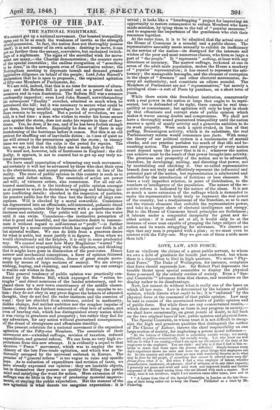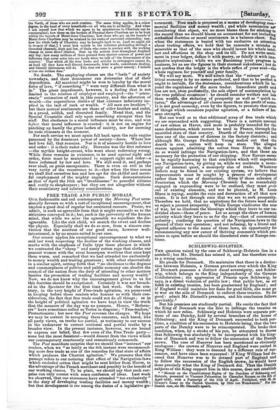LOVE, LAW, AND FORCE.
LET us vindicate the claims of a great public servant, to whom we owe a debt of gratitude for benefit just conferred, but whom there is a disposition to libel in high quarters. We mean " Phy- sical Force." The Duke of Wellington, for instance, complains that force should supersede law. Sir Robert Peel deprecates the trouble thrust upon special constables to display the physical force possessed by the orderly section of society. Even a " Spe- cial Constable '46 advances from that chorus, and moralizes on the display rather to its disadvantage.
Now, law cannot do without what is really one of the bases on which all law rests. Law is determined by the balance of public opinion, which directs what ought to be ; it is "enforced" by the physical force at the command of that public opinion. Law may be said to consist of the ascertained results of public opinion and of public force. But while there are any unascertained results,— which there must be so long as there is any progress in society,— we shall have occasionally, on great points of doubt, to fall back on the two original bases of law, public opinion and physical force. The Special Constable, in whose tract it is not difficult to recog- nize the high and generous qualities that distinguish the author of The Claims of Labour, throws the chief responsibility on one large section of society, for neglecting a potent moral influence-
" At the bottom of Chartism there is something socially wrong; not merely politically or politico-economically, but socially wrong. You who -know me well will see to what I am coming,—that I am upon my old subject of the duty of the employers to the employed. You are right: and why is it that I find in this re- lation so much that bears upon the present difficulty? Simply because every day's experience shows me more and more the great things that employers can do. In this country and others there are men with wonderful theories as to what may be done for the people, if soniething that cannot be altered were very clif: ferent from what it is. But when I find a wise employer of labour, whether manufacturer, landowner, shopkeeper, chief of artisans, or in any other capacity, I presently see peace and order and solid work and improved health and further enjoyment of life extend among those who are blessed with such a master. How easily, were it not invidious, might I not mention name after name, here and in • " A Letter from One of the Special Constables in London on the late Occa- sion of their being called out to keep the Peace." Published as a tract by Mr. Pickering. the North, of those who are such masters. The same thing applies, in a minor degree, to the head of every household—to all who are in authority. And when I ask myself how that which we agree to be mischievous in Chartism can be counteracted; how those on the borders of Physical-force Chartism are to be kept within the bouods of Moral-force Chartism; how those who are on the bounds of Moral-force Chartism may be retained iu the ranks of contented citizenship; nay, how the whole body of Chartists may be brought back to us, (and we ought not to despair of that,) I must look mainly to the influence permeating through a thousand channels, high and low, of those who come in contact with the working classes in some direct relation. Sum up the actions done throughout England any day: how many millions of them proceed from obscure sources of power and influence that never enter into our heads when we talk of the Government of the country.' That which all the wise books and articles in newspapers cannot do, at least till they have well filtered downwards, kind words, considerate dealing, and friendly intercourse will do. This dues not seem a grand remedy: I believe a true one seldom does."
No doubt. The employing classes are the " lords" of society, nowadays, and their demeanour can determine that of their dependents. All mankind might be won to loyalty by the moral force of love, " if something" " were very different from what it is." The great impediment, however, is a feeling that is not limited to the relation of employer and employed—the " aristo- cratic" estimation of rank in this country, and the adoration of wealth—the supercilious dislike of that extreme inferiority im- plied in the lack of rank or wealth. " All men are brothers " ; but their mutual sentiments are those of elder brother and cadet, in a proud, selfish, and disunited family. Mend that, and the Special Constable shall rely upon something stronger than his staff. But obedience to a moral influence must be won, and won before that moral influence is exerted : it is not an engine for patching up hastily the gross laches of society, nor for coercing its rude elements at the moment.
For such service we must again fall back upon the rude engine possessed by the dominant power of society—force. Where law and love fail, that remains. Nor is it of necessity hostile to love and order : it is their ruder ally. Hercules was the first reformer —the mythic knight-errant, who went about redressing wrong. While force remains in existence, to be used against right and order, force must be maintained to support right and order—a force informed by law and love. We still need it, and perhaps ever shall, on great emergencies. There is even an evil in the very rarity of the recurrence to it—that when the time comes we shall find ourselves less and less apt for the skilful and merci- ful employment of the mighty engine. Such demonstrations 48 that of April the 10th are "troublesome" to peaceful citizens and costly to shopkeepers ; but they are not altogether without their consolatory and salutary considerations.



























 Previous page
Previous page